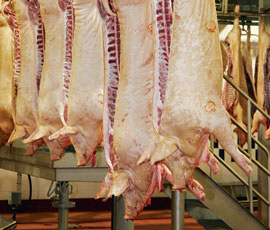Marketplace has mixed messages for pig producers

The year 2012 proved an extremely challenging one for pig producers but for those still in the industry the New Year provides some more positive pointers.
UK pig prices have ended the year at high levels with the Deadweight Average Pig Price (DAPP) for the week ended 15 December at 161p/kg DW.
However, feed costs are also at record levels and pig prices will need to breach the 175p/kg mark next year to restore profitability, let alone allow for reinvestment.
With a gap of 10p-15p/kg between average slaughter prices and cost of production (COP), most producers are losing money. BPEX estimates COP at 167p/kg DW compared with average deadweight prices of 155p-160p/kg.
Despite recent DAPP rises, most weekly contract shout prices have remained stubbornly stuck for several weeks. Although pig numbers are tightening overall, abattoirs do not want to be left with stock after the holiday and there is also price pressure from mainland Europe, where pig prices have fallen 15p/kg over the last few weeks.
UK weaner values are however continuing to rise slowly, reflecting some confidence in finished pig prices next year.
Finance
Unless there is a fairly rapid increase in pigmeat prices or a reduction in feed costs, UK producers may need to re-finance their businesses and increase overdrafts at a time when bank lending is subject to tight controls.
Many pig producers without large areas of arable land may find further funding is impossible – signs are emerging that some of the main UK banks are reluctant to, or not prepared to, secure lendings against purely livestock assets.
Major reinvestment is sorely lacking on both indoor and outdoor units due to low profitability and losses over the last few years. Unless these units can be re-financed or the imbalance between pig prices and production costs is reversed, the UK herd size will fall further.
Contract pig rearing or finishing for third-party operators may provide an escape route for those unable to finance their own businesses, also giving some protection from market price fluctuations.
Better news
Producers and employees will be relieved by the agreement for a management buyout of Vion’s pork business, subject to competition authority approval (see more on Business, page 20).
Vion operates pig abattoirs at Wiveliscombe, Malton; and at Cookstown in Northern Ireland, in addition to pork processing facilities in several locations.
New management and improved efficiency savings should bring a boost alongside fresh competition when pig numbers are shrinking.
The recent Tesco initiative to set up direct contracts with producers will put more competition into the finished pig market. The retailer is looking for 15,000 pigs a week on an annually agreed COP price, which will include a monthly escalator tied to the price of wheat and soya.
However, to allow producers to reinvest in worn-out units as well as earning a profit margin, the initial Tesco contract price figure will need to be in the 175p/kg region.
With an estimated 80% of UK finished pigs sold on contract, potential Tesco suppliers will also need to serve notice to terminate existing contracts, which on average require six months’ prior notification.
Renewed Vion and Tesco activity in the spring should coincide with forecast reductions in the availability of EU mainland-produced pigmeat, due to the partial Europe-wide stall and tether ban which becomes effective on 1 January 2013.
Although 18 EU mainland countries may be ready for the ban, many have further work to do and potentially only about 70% of EU pigmeat production will be stall and tether free by the deadline.
It looks unlikely that all EU member countries will be prepared to take legal action against non-compliant producers, putting UK retailers under increasing pressure to audit all sources of imported pigmeat.
